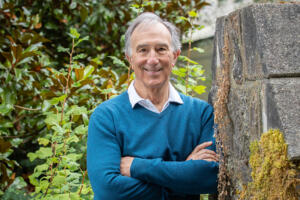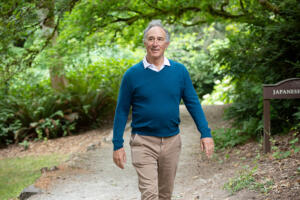The Conservationist Next Door
For generations, conservationists have worked to protect natural places and the life within them—efforts that continue to evolve in response to the challenges of a modern world.
 At the forefront of this movement is Bellevue Club member Peter Seligmann, a conservationist whose influence spans continents, communities and decades. His work has helped reshape how the world values nature—not just as a resource but as an investable asset for our shared future.
At the forefront of this movement is Bellevue Club member Peter Seligmann, a conservationist whose influence spans continents, communities and decades. His work has helped reshape how the world values nature—not just as a resource but as an investable asset for our shared future.
Peter is, among many things, the cofounder of Conservation International (CI), a nonprofit focused on the link between human well-being and the natural world through scientific and policy partnerships with governments, businesses and communities worldwide.
As CEO of CI from 1987 to 2017, Peter helped protect over 2.3 million square miles of land and water across more than 70 countries.
A trip to the American West left a lasting impression on a young Peter. “When I was 13 years old, I worked on a ranch in Wyoming,” he recalls. “My job was to irrigate the pastures. As I waited for water to flow across the fields, I watched bumblebees select which stalks of grass to gather pollen from.”
It was then that he realized the bees were making choices—and those choices influenced the environment. He also recognized that human well-being is closely connected to the natural world and the systems that sustain it.
While at CI, Peter forged partnerships with major global corporations, including Starbucks and Walmart. The goal was to build a bridge between conservation and business, demonstrating that the two are not mutually exclusive.
The collaborations acknowledged that these big corporate players rely on natural resources (coffee, beef, seafood) for their business and that improving the environmental impact of their supply chains could protect and improve their bottom line. He worked with companies to explore how supporting conservation efforts could help reduce future risks and improve supply chain resilience—benefiting both the environment and their business operations.
Peter is also credited with playing a key role in the first-ever debt-for-nature swap—a landmark model linking debt relief with environmental protection. In 1987, as  he was paddling down a river in the Amazon, he picked up a wet newspaper and read that the president of Peru had declared that his country would not pay the debts it owed to foreign banks. “As the value of this debt decreased, it could be bought for pennies on the dollar,” says Peter. “I had the idea that we [CI] should buy the debt and offer to forgive it in exchange for the protection of large conservation areas. We did the first debt-for-nature swap in 1987 with the government of Bolivia and created the Beni Biosphere Reserve. Many more followed.”
he was paddling down a river in the Amazon, he picked up a wet newspaper and read that the president of Peru had declared that his country would not pay the debts it owed to foreign banks. “As the value of this debt decreased, it could be bought for pennies on the dollar,” says Peter. “I had the idea that we [CI] should buy the debt and offer to forgive it in exchange for the protection of large conservation areas. We did the first debt-for-nature swap in 1987 with the government of Bolivia and created the Beni Biosphere Reserve. Many more followed.”
After stepping down as CEO of CI in 2017, Peter cofounded Nia Tero, a global NGO based in Seattle, committed to supporting the rights that Indigenous people around the world have, to protect their native environment. “At CI I was exposed to Indigenous leaders and their concerns that conservation programs had displaced people from their homelands,” he says. “What I realized,” he continues, “was that Indigenous people safeguard close to one-third of the earth and that their territories contain at least 40% of global biodiversity and 25% of stored carbon.” To date, Nia Tero has partnered with more than 300 Indigenous communities that are stewards of more than 300 million acres across the world.
It is carbon that is the crux of Peter’s most recent undertaking as chairman of the board of Silvania, a natural capital investment fund that helps governments and landowners generate carbon credits through large-scale forest restoration and conservation.
On a recent walk through the Arboretum, Peter explained to me that the goal is to monetize what nature provides and to help private capital support large-scale  restoration. In his view, philanthropy and public funding are essential but insufficient. “Silvania is a fund created to establish that nature is an investable asset class,” he explains.
restoration. In his view, philanthropy and public funding are essential but insufficient. “Silvania is a fund created to establish that nature is an investable asset class,” he explains.
Is valuing nature as a commodity the only key to ensuring that the planet remains habitable for all beings? No, says Peter, “the key word is reciprocity. We are related to nature and need to see the natural world as a relative rather than simply a resource.”
Population growth and consumption have had “radical unanticipated impacts on the stability of ecological systems and their ability to support life,” Peter explains. This threatens weather patterns, food security, clean water and breathable air worldwide. “The simple truth is that we depend upon nature to make this planet healthy.”
When asked to reflect on his impact and what he hopes his work has made possible for future generations, Peter answered, “a recognition that innovations are essential. That doing what we have done in the past is insufficient, and we must look for new approaches and think long-term because the future always arrives.”
Peter has a long list of accolades: he was named one of Time magazine’s 100 Most Influential People and he is a member of the Council on Foreign Relations. He is recognized as one of Yale’s most influential graduates and is a frequent speaker at the World Economic Forum in Davos, Switzerland.
In person, Peter is friendly, charming and utterly self-effacing. He is married to Lee Rhodes, founder of Seattle-based glassybaby, which has donated more than $15 million to various charities. If you’re unfamiliar, glassybaby is a line of glass votive candle holders available in over 500 colors that shot to fame after Martha Stewart hosted Lee on her show in 2005. When asked which color is his favorite, Peter diplomatically answered, “All of them.”
Between them, Peter and Lee have six adult children and a growing gaggle of grandchildren. At 74, Peter spends as much time as he can at his ranch in Montana, where he works to protect the local wildlife, grow food, and study soil and forest restoration in between visits from his kids and grandkids.









